- Home
- Ken Follett
Night Over Water Page 21
Night Over Water Read online
Page 21
Luther recovered from the shock quickly. The stunned look left his face. He broke Eddie’s hold with a swift, powerful move and threw a punch. Eddie dodged it and hit him in the stomach twice. Luther expelled air like a cushion and doubled up. He was strong, but out of condition. Eddie grabbed him by the throat and started to squeeze.
Luther stared at him out of terrified eyes.
After a moment Eddie realized he was killing the man.
He eased his grip, then let go completely. Luther slumped against the wall, gasping for air, his hand on his bruised neck.
The Irish customs officer looked out of the shed. He must have heard the thump as Eddie threw Luther against the wall. “What happened?”
Luther stood upright with an effort. “I stumbled, but I’m okay,” he managed.
The customs man bent down and picked up Luther’s hat. He gave them a curious look as he handed it over, but he said no more and went back inside.
Eddie looked around. No one else had observed the scuffle. The passengers and crew had disappeared around the other side of the little railway station.
Luther put his hat on. In a hoarse voice he said: “If you mess this up we’ll both be killed as well as your damn wife, you imbecile.”
The reference to Carol-Ann maddened Eddie all over again, and he drew back his fist to hit Luther, but Luther raised a protective arm and said: “Calm down, will you? You won’t get her back that way! Don’t you understand that you need me?”
Eddie understood that perfectly well: he had simply lost his reason for a few moments. He took a step back and studied the man. Luther was well-spoken and expensively dressed. He had a bristly blond mustache and pale eyes full of hate. Eddie had no regrets about punching him. He had needed to hit something and Luther was an appropriate target. Now he said: “What do you want from me, you pile of shit?”
Luther put his hand inside his suit jacket. It crossed Eddie’s mind that there might be a gun in there, but Luther took out a postcard and handed it over.
Eddie looked at it. It was a picture of Bangor, Maine. “What the hell does this mean?”
Luther said: “Turn it over.”
On the other side was written:44.70N, 67.OOW
“What are these numbers—map coordinates?” Eddie said.
“Yes. That’s where you have to bring the plane down.”
Eddie stared at him. “Bring the plane down?” he repeated stupidly.
“Yes.”
“That’s what you want from me—that’s what this is all about?”
“Bring the plane down right there.”
“But why?”
“Because you want your pretty wife back.”
“Where is this location?”
“Off the coast of Maine.”
People often assumed a seaplane could splash down anywhere, but in fact it needed very calm waters. For safety, Pan American would not allow a touchdown in waves more than three feet high. If the plane came down in a heavy sea, it would break up. Eddie said: “You can’t land a flying boat in the open sea—”
“We know that. This is a sheltered place.”
“That doesn’t mean—”
“Just check it out. You can come down there. I made sure of it.”
He sounded so confident that Eddie sensed he really had made sure. But there were other snags. “How am I supposed to bring the plane down? I’m not the captain.”
“I’ve looked into this very carefully. The captain could bring the plane down in theory, but what excuse would he have? You’re the engineer. You can make something go wrong.”
“You want me to crash the plane?”
“You’d better not—I’m going to be on board. Just have something go wrong so the captain is forced to make an unscheduled splashdown”—he touched the postcard with a manicured finger—“right there.”
The engineer could create a problem that would force the plane down, no doubt about that; but an emergency was difficult to control, and Eddie could not immediately see how to arrange an unscheduled splashdown at such a precise location. “It just ain’t that easy—”
“I know it’s not easy, Eddie. But I know it can be done. I checked.”
Who had he checked with? Who was he? “Who the hell are you, anyway?”
“Don’t ask.”
Eddie had started out threatening this man, but somehow the tables had turned, and now he felt intimidated. Luther was part of a ruthless team that had planned this carefully. They had picked out Eddie to be their tool; they had kidnapped Carol-Ann; they had him in their power.
He put the postcard in the pocket of his uniform jacket and turned away.
“So you’ll do it?” Luther said anxiously.
Eddie turned back and gave him a cold stare. He held Luther’s eyes for a long moment, then walked away without speaking.
He was acting tough but in truth he was floored. Why were they doing this? At one point he had speculated that the Germans wanted to steal a Boeing 314 to copy it, but that far-fetched theory was now washed out completely, for the Germans would want to steal the plane in Europe, not Maine.
The fact that they were so precise about the location at which they wanted the Clipper to come down was a clue. It suggested there would be a boat waiting there. But what for? Did Luther want to smuggle something or somebody into the United States—a suitcase full of opium, a bazooka, a Communist agitator or a Nazi spy? The person or thing would have to be pretty damned important to be worth all this trouble.
At least he knew why they had picked on him. If you wanted to bring the Clipper down, the engineer was your man. The navigator could not do it, nor could the radio operator, and a pilot would need the cooperation of his copilot; but an engineer, all on his own, could stop the engines.
Luther must have got a list of Clipper engineers out of Pan American. That would not be too difficult: someone could have broken into the offices one night, or just bribed a secretary. Why Eddie? For some reason Luther decided on this particular flight, and got hold of the roster. Then he asked himself how to make Eddie Deakin cooperate, and came up with the answer: kidnap his wife.
It would break Eddie’s heart to help these gangsters. He hated crooks. Too greedy to live like regular people and too lazy to earn a buck, they cheated and stole from hardworking citizens and lived high on the hog. While others broke their backs plowing and reaping, or worked eighteen hours a day to build up a business, or dug for coal under the ground or sweated all day in a steelworks, the gangsters went around in fancy suits and big cars and did nothing but bully people and beat them up and scare them to death. The electric chair was too good for them.
His father had felt the same. He remembered what Pop had said about bullies at school: “Those guys are mean, all right, but they ain’t smart.” Tom Luther was mean, but was he smart? “It’s tough to fight those guys, but it ain’t so hard to fool ’em,” Pop had said. But Tom Luther would not be easy to fool. He had thought up an elaborate plan, and so far it seemed to be working perfectly.
Eddie would have done almost anything for a chance to fool Luther. But Luther had Carol-Ann. Anything Eddie did to foul up Luther’s scheme might lead them to hurt her. He could not fight them or fool them: he just had to try to do what they wanted.
Seething with frustration, he left the harbor and crossed the single road that led through the village of Foynes.
The air terminal was a former inn with a central yard. Since the village had become an important flying-boat airport, the building had been almost entirely taken over by Pan American; although there was still a bar, called Mrs. Walsh’s pub, in a small room with its own street door. Eddie went upstairs to the operations room, where Captain Marvin Baker and First Officer Johnny Dott were in conference with the Pan American station chief. Here, amid the coffee cups and ashtrays and the piles of radio messages and weather reports, they would take the final decision whether to make the long transatlantic crossing.
The crucial factor was the strength
of the wind. The westward trip was a constant battle against the prevailing wind. Pilots would change altitude constantly in a search for the most favorable conditions, a game known as “hunting the wind.” The lightest winds were generally found at lower altitudes, but below a certain point the plane would be in danger of colliding with ships or, more likely, icebergs. Strong winds required more fuel, and sometimes the forecast winds were so strong that the Clipper simply could not carry enough to last the two thousand miles to Newfoundland. Then the flight would have to be postponed, and the passengers would be taken to a hotel to wait until the weather improved.
But if that should happen today, what would become of Carol-Ann? Eddie took a preliminary glance at the weather reports. The winds were strong and there was a storm in the mid-Atlantic. He knew that the plane was full. Therefore, there would have to be a careful calculation before the flight could get the go-ahead. The thought ratcheted up his anxiety: he could not bear to be stuck in Ireland while Carol-Ann was in the hands of those bastards on the other side of the ocean. Would they feed her? Did she have somewhere to lie down? Was she warm enough, wherever they were holding her?
He went to the Atlantic chart on the wall and checked the map reference Luther had given him. The spot had been quite well chosen. It was close to the Canadian border, a mile or two offshore, in a channel between the coast and a large island, in the Bay of Fundy. Someone who knew a little about flying boats would think it an ideal place to come down. It was not ideal—the ports used by the Clippers were even more sheltered—but it would be calmer than the open sea, and the Clipper would probably be able to splash down there without great risk. Eddie was somewhat relieved: at least that part of the scheme might be made to work. He realized he had a big investment in the success of Luther’s plan. The thought left a sour taste in his mouth.
He was still worried about just how he would bring the plane down. He could fake engine trouble, but the Clipper could fly on three engines, and there was an assistant engineer, Mickey Finn, who could not be fooled for very long. He racked his brains, but did not come up with a solution.
Plotting to do this to Captain Baker and the others made him feel like the worst kind of heel. He was betraying people who trusted him. But he had no choice.
Now an even greater hazard occurred to him. Tom Luther might not keep his promise. Why should he? He was a crook! Eddie might bring the plane down and still not get Carol-Ann back.
The navigator, Jack, came in with some more weather reports, and shot a peculiar look at Eddie. Eddie realized that no one had spoken to him since he came into the room. They seemed to be tiptoeing around him: had they noticed how preoccupied he was? He had to make more effort to behave normally. “Try not to get lost this trip, Jack,” he said, repeating an old joke. He was not much of an actor and the gag seemed forced to him, but they laughed and the atmosphere eased.
Captain Baker looked at the fresh weather reports and said: “This storm is getting worse.”
Jack nodded. “It’s going to be what Eddie would call a honker.”
They always ribbed him about his New England dialect. He managed to grin, and said: “Or a baster.”
Baker said: “I’m going to fly around it.”
Together, Baker and Johnny Dott produced a flight plan to Botwood, in Newfoundland, skirting the edge of the storm and avoiding the worst of the head winds. When they were finished, Eddie sat down with the weather forecasts and began his calculations.
For each sector of the trip, he had predictions of the wind direction and force at one thousand feet, four thousand, eight thousand and twelve thousand. Knowing the cruising airspeed of the plane and the wind force, Eddie could calculate the ground speed. That gave him a flight time for each sector at the most favorable altitude. Then he would use printed tables to find the fuel consumption over that time with the current payload of the Clipper. He would plot the fuel requirement stage by stage on a graph, which the crew called “the Howgozit Curve.” He would work out the total and add a safety margin.
When he completed his calculations he saw to his consternation that the amount of fuel required to get them to Newfoundland was more than the Clipper could carry.
For a moment he did nothing.
The shortfall was terribly small: just a few pounds of payload too much, a few gallons of gas too little. And Carol-Ann was waiting somewhere, scared to death.
He should now tell Captain Baker that takeoff would have to be postponed until the weather improved, unless he was willing to fly through the heart of the storm.
But the gap was so small.
Could he lie?
There was a safety margin built in, anyhow. If things went badly the plane could fly through the storm instead of going around it.
He hated the thought of deceiving his captain. He had always been aware that the lives of the passengers depended on him, and he was proud of his meticulous accuracy.
On the other hand, his decision was not irrevocable. Every hour during the trip he had to compare actual fuel consumption with the projection on the Howgozit Curve. If they burned more than anticipated they simply had to turn back.
He might be found out, and that would be the end of his career, but what did that matter when the lives of his wife and his unborn baby were at stake?
He worked through the calculations again; but this time, when checking the tables, he made two deliberate errors, taking fuel consumption for the lower payload in the next column of figures. Now the result came inside the safety margin.
Still, he hesitated. Lying did not come easily to him, even in this appalling predicament.
Finally Captain Baker got impatient and looked over Eddie’s shoulder, saying: “Snap it up, Ed—do we go or stay?”
Eddie showed him the doctored result on the pad and kept his eyes down, not wanting to look his captain in the eye. He cleared his throat nervously, then did his best to speak in a firm, confident voice.
He said: “It’s close, Captain—but we go.”
PART III
FOYNES TO MID-ATLANTIC
CHAPTER ELEVEN
Diana Lovesey stepped onto the dock at Foynes and felt patheti cally grateful for the feeling of solid ground under her feet.
She was sad but calm. She had made her decision: she was not going to get back on the Clipper, she was not going to fly to America and she was not going to marry Mark Alder.
Her knees seemed wobbly, and for a moment she was afraid she might fall, but the sensation passed and she walked along the dock to the customs shed.
She put her arm through Mark’s. She would tell him as soon as they were alone. It would break his heart, she thought with a stab of grief: he loved her very much. But it was too late to think of that now.
The passengers had disembarked, all except the odd couple sitting near Diana, handsome Frank Gordon and bald Ollis Field. Lulu Bell had not stopped chatting to Mark. Diana ignored her. She no longer felt angry with Lulu. The woman was intrusive and overbearing, but she had enabled Diana to see her true situation.
They passed through customs and left the dock. They found themselves at the western end of a one-street village. A herd of cows was being driven along the street, and they had to wait while the beasts passed.
Diana heard Princess Lavinia say loudly: “Why have I been brought to this farm?”
Davy, the little steward, replied in a soothing voice: “I’ll take you into the terminal building, Princess.” He pointed across the road to a large building like an old inn with ivy growing up the walls. “There’s a very comfortable bar, called Mrs. Walsh’s pub, where they sell excellent Irish whiskey.”
When the cows had gone, several of the passengers followed Davy to Mrs. Walsh’s pub. Diana said to Mark: “Let’s walk through the village.” She wanted to get him on his own as soon as possible. He smiled and agreed. However, some other passengers had the same idea, Lulu among them; and it was a small crowd that strolled along the main street of Foynes.
There w
ere a railway station, a post office and a church, then two rows of gray stone houses with slate roofs. Some of the houses had shop fronts. There were several pony carts parked along the street but only one motorized truck. The villagers, dressed in tweeds and homespun, stared at the visitors in silk and furs, and Diana felt as if she were in a procession. Foynes had not yet got used to being a stopover for the world’s wealthy and privileged elite.
She was hoping that the party would split up, but they stayed together in a knot, like explorers afraid of getting lost. She began to feel trapped. Time was passing. They went by another bar, and she suddenly said to Mark: “Let’s go in there.”
Lulu immediately said: “What a great idea—there’s nothing to see in Foynes.”
Diana had had quite enough of Lulu. “I’d really like to talk to Mark alone,” she said crossly.
Mark was embarrassed. “Honey!” he protested.
“Don’t worry!” Lulu said immediately. “We’ll walk on, and leave you lovers alone. There’ll be another bar, if I know anything at all about Ireland!” Her tone was gay, but her eyes were cold.
Mark said: “I’m sorry, Lulu—”
“Don’t be!” she said brightly.
Diana did not like Mark apologizing for her. She turned on her heel and went into the building, leaving him to follow at his leisure.
The place was dim and cool. There was a high bar, with bottles and barrels racked behind it. In front were a few wooden tables and chairs on a plank floor. Two old men sitting in the comer stared up at Diana. She was wearing an orange-red silk coat over her dotted dress. She felt like a princess in a pawnshop.
A small woman in an apron appeared behind the bar. Diana said: “May I have a brandy, please?” She wanted some Dutch courage. She sat down at a small table.
Mark came in—probably having apologized some more to Lulu, Diana thought sourly. He sat beside her and said: “What was all that about?”
“I’ve had enough of Lulu,” Diana said.
“Why did you have to be so rude?”
“I wasn’t rude. I simply said I wanted to talk to you alone.”

 The Pillars of the Earth
The Pillars of the Earth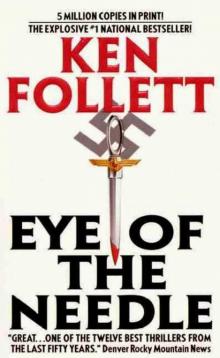 Eye Of The Needle
Eye Of The Needle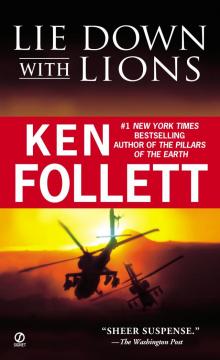 Lie Down With Lions
Lie Down With Lions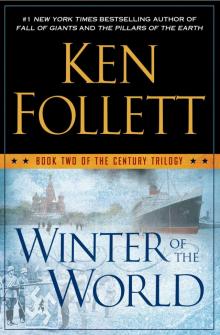 Winter of the World
Winter of the World Triple
Triple World Without End
World Without End Fall of Giants
Fall of Giants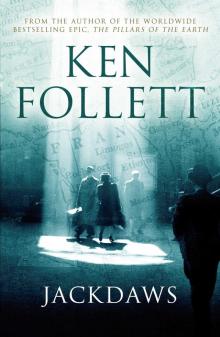 Jackdaws
Jackdaws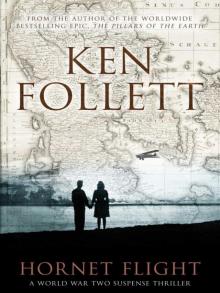 Hornet Flight
Hornet Flight Whiteout
Whiteout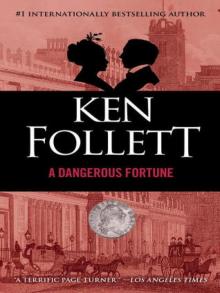 A Dangerous Fortune
A Dangerous Fortune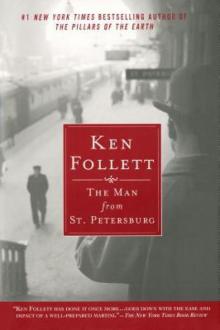 The Man From St. Petersburg
The Man From St. Petersburg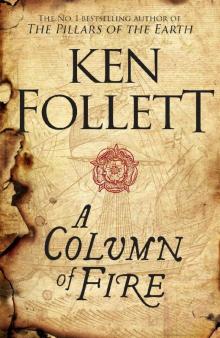 A Column of Fire
A Column of Fire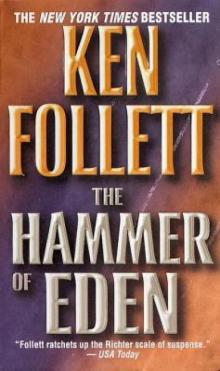 The Hammer of Eden
The Hammer of Eden On Wings of Eagles
On Wings of Eagles The Evening and the Morning
The Evening and the Morning The Key to Rebecca
The Key to Rebecca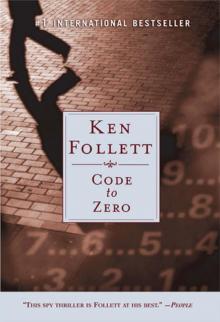 Code to Zero
Code to Zero Paper Money
Paper Money A Place Called Freedom
A Place Called Freedom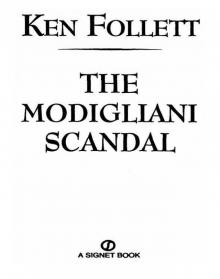 The Modigliani Scandal
The Modigliani Scandal Triple (1991)
Triple (1991) A Dangerous Fortune (1994)
A Dangerous Fortune (1994)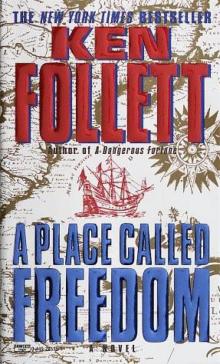 A Place Called Freedom (1995)
A Place Called Freedom (1995)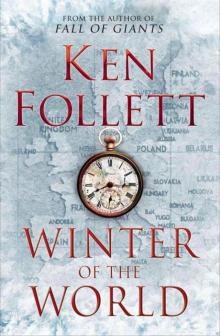 Winter of the World (Century Trilogy 2)
Winter of the World (Century Trilogy 2) Code to Zero (2000)
Code to Zero (2000)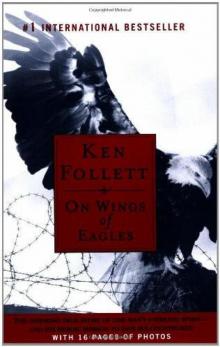 On Wings Of Eagles (1990)
On Wings Of Eagles (1990) Storm Island
Storm Island Fall of Giants (The Century Trilogy)
Fall of Giants (The Century Trilogy)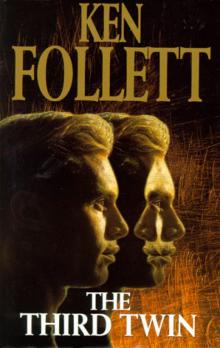 the Third Twin (1996)
the Third Twin (1996)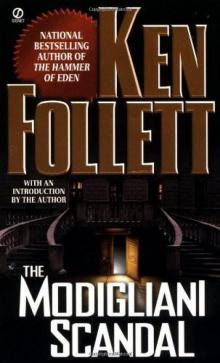 The Modigliani Scandal (1976)
The Modigliani Scandal (1976)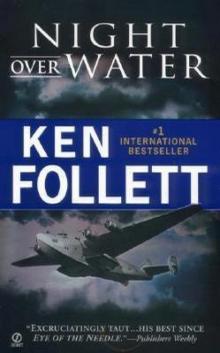 Night Over Water
Night Over Water